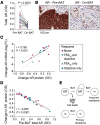Androgen receptor activity in prostate cancer dictates efficacy of bipolar androgen therapy through MYC
- PMID: 36194476
- PMCID: PMC9711876
- DOI: 10.1172/JCI162396
Androgen receptor activity in prostate cancer dictates efficacy of bipolar androgen therapy through MYC
Abstract
Testosterone is the canonical growth factor of prostate cancer but can paradoxically suppress its growth when present at supraphysiological levels. We have previously demonstrated that the cyclical administration of supraphysiological androgen (SPA), termed bipolar androgen therapy (BAT), can result in tumor regression and clinical benefit for patients with castration-resistant prostate cancer. However, predictors and mechanisms of response and resistance have been ill defined. Here, we show that growth inhibition of prostate cancer models by SPA required high androgen receptor (AR) activity and were driven in part by downregulation of MYC. Using matched sequential patient biopsies, we show that high pretreatment AR activity predicted downregulation of MYC, improved clinical response, and prolonged progression-free and overall survival for patients on BAT. BAT induced strong downregulation of AR in all patients, which is shown to be a primary mechanism of acquired resistance to SPA. Acquired resistance was overcome by alternating SPA with the AR inhibitor enzalutamide, which induced adaptive upregulation of AR and resensitized prostate cancer to SPA. This work identifies high AR activity as a predictive biomarker of response to BAT and supports a treatment paradigm for prostate cancer involving alternating between AR inhibition and activation.
Keywords: Oncology; Prostate cancer.
Figures







Comment in
- Is androgen receptor activity in metastatic prostate cancer a good biomarker for bipolar androgen therapy? doi: 10.1172/JCI165357
References
-
- Kokontis J, et al. Increased androgen receptor activity and altered c-myc expression in prostate cancer cells after long-term androgen deprivation. Cancer Res. 1994;54(6):1566–1573. - PubMed
Publication types
MeSH terms
Substances
Grants and funding
LinkOut - more resources
Full Text Sources
Other Literature Sources
Molecular Biology Databases
Research Materials

